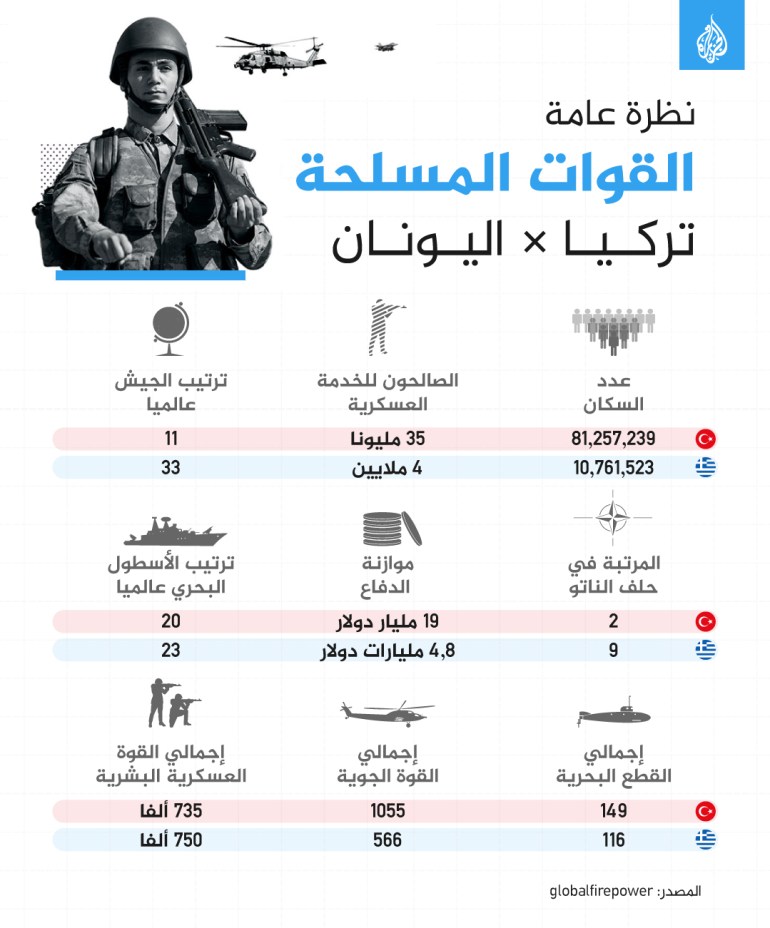"We are confident that all issues and disputes between Turkey and Greece can be resolved through peaceful means."
President Recep Tayyip Erdogan
The Turkish president said it in 2017 at a joint press conference with Greek Prime Minister Alexis Tsipras on his "historic" visit to Greece, which was considered the first of its kind in 65 years.
Although Turkey and Greece are under the North Atlantic Treaty Organization (NATO) and are neighbors by land and sea, the issues and differences that Erdogan referred to at the time - apparently - were not resolved, and they hardly subsided until they returned again.
Relations between the two countries have gone through periods of ebb and flow since Greece's independence from the Ottoman Empire, and although relations improved between them after World War II and their accession to NATO in 1952, relations deteriorated again in the 1950s.
The most prominent reasons were their disagreement over the island of Cyprus, the expulsion of the Greeks from Turkey in the 1960s, the Turkish acquisition of northern Cyprus in 1974 and the confrontation between the two countries over the Aegean Sea.
The matter came to talk about the possibility of a direct military confrontation between Turkey and Greece in the eastern Mediterranean.
(Reuters)
Why are these tensions erupting now?
Recent months have witnessed an escalation of tension between Turkey and Greece, which has been increased by the activities of the two countries in the eastern Mediterranean, and by their signing of agreements delineating maritime borders with other countries bordering the Mediterranean basin.
Ankara wants to explore for gas in a marine area over which Greece declares its control, and Ankara sees it - according to its agreement with Tripoli - a Turkish sphere of influence.
This was preceded by the known influx of migrants from the Middle East to Europe, when Ankara briefly implemented a long-awaited threat to "open the gates" to allow tens of thousands of asylum seekers to cross into Greece.
Meanwhile, the European Union accused Turkey of using migrants as a bargaining tool.
Relations were further strained last July due to the re-conversion of Istanbul's Hagia Sophia Museum into a mosque, which led to the revival of a centuries-old conflict over one of the most contested religious buildings in the world, and angered Russia and Greece, the centers of Orthodox Christianity.
Meanwhile, Turkey began naval military exercises the day before yesterday with live ammunition off the coast of the city of Iskenderun overlooking the eastern Mediterranean, and said that it "does not violate anyone's rights" and that "it will not allow anyone to violate their rights."
On the other hand, the Greek Finance Minister affirmed that his country is currently communicating with France and other countries to acquire military equipment with the aim of lifting what he described as the ability to deter.
These developments increased the tension between the two countries, until the matter came to talk about the possibility of direct military confrontation between Turkey and Greece in the eastern Mediterranean, and about the naval military capabilities of both countries.
Who will prevail today?
The American site Global Firepower compared the military forces of the Turkish and Greek armies according to 2020 statistics, which showed that the Turkish army ranks 11th in the world, while the Greek army ranks 33rd among the most powerful 138 armies in the world, which shows a huge difference. With the military capabilities of both NATO member states.
Turkey has a population of more than 81 million people, 35 million of whom are fit for military service, while the population in Greece reaches about 11 million people, of whom about 4 million are fit for military service.
Turkey's defense budget is 141 billion liras (about 19 billion dollars), while the defense budget in Greece is only 4.8 billion dollars, according to Global Fire Power's classification.
As for the naval forces, which will be the main weapon in the event of an armed conflict in the eastern Mediterranean region, the Turkish fleet ranks 20th in the world in the number of units, while the Greek navy is ranked 23rd in the world.
In addition to the Turkish fleet of armed drones manufactured by Ankara, and it can cause heavy losses to any enemy targets, which gives a remarkable advantage to the Turkish Navy.
Turkish supremacy
The data indicate a remarkable superiority of the Turkish forces over their Greek counterpart, in addition to the presence of two important factors that favor the Turkish fleet, which is the superiority of the Turkish defense industries and the armed forces' use of many weapons and home-made military systems.
This gives Turkey a great advantage in terms of ease of maintenance, access to spare parts and the possibility of continuous modernization, in addition to the participation of the Turkish Navy in many international missions on an ongoing basis.
Does tension turn into hostilities?
Simply we can summarize the relationship between Turkey and Greece with a "long history of conflict," as they were joined by 4 major wars, and they divided an island and quarreled over the waters, including them.
They are national, social and religious residues that have deepened the dispute between the two neighbors. Can the tension turn into hostilities?
The matter is increasingly likely, though unlikely - according to analysts - and if violence breaks out, it will be a disaster that cannot be mitigated, and both sides have expressed their desire to conduct negotiations.
But as brinkmanship increases, so does the possibility of accidental escalation.

